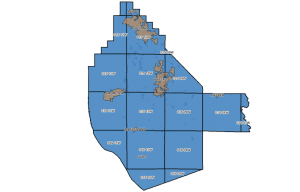Local news watches out for you
(Editor’s note: This article is part of a series exploring media literacy and its multiple facets. This week, the inner operations of local news outlets – and their role in upholding democracy – is explained.)
Years ago, the city manager of Bell, Calif., collected an $800,000 salary – double that of the President of the United States.
Robert Rizzo was a pivotal figure in Bell from the early 1990s until 2010, providing ample time for Rizzo and his colleagues to continue giving themselves substantial pay raises. As many pointed out, there was something about the conditions in Bell that led to a fruitful ground for exploitation.
“There were no checks and balances to control Mr. Rizzo and those that were in power in that city,” Los Angeles Superior Court Judge Kathleen Kennedy said in her ruling, per National Public Radio.
This corruption began after Bell’s local news outlet, which provided coverage of local matters, shut down. Today, the scandal in Bell is referred to by media scholars as a prime example of what can go wrong in the absence of a community newspaper.
“From the beginning of this country and even before the founding of this country, the press’s job was to serve as the watchdog of the government,” said Gary Hicks, longtime journalist and professor of mass communications at Southern Illinois University Edwardsville. “In that way it works for us; it works for us in no less of a way than an official arm of government.”
Even in communities where local news outlets exist, conglomerates and financial firms may impede on this watchdog function, the CBS show 60 Minutes recently reported. Nearly one third of daily newspapers in the U.S. are owned by hedge funds and other financial firms, the report said.
Local outlets being controlled by outside financial interests, it continued, can lead to higher priority being placed on maximizing revenue – not the civic value news can lend.
“The investigative arms of local papers have just been decimated over the last decade because the big companies that buy them out don’t see that bringing in the money,” Hicks said. “There’s very little local investigative reporting going on, and that’s the heart of the watchdog function.”
The Republic-Times falls within the two-thirds of newspapers in the United States that are not owned by a hedge fund or large financial firm. It is locally owned and operated, and is a community-supported newspaper serving Monroe County and surrounding areas since 1890.
“(The community) should understand how lucky they are and how quickly that can be taken away,” Hicks said.
While each individual newsroom may vary in its owner and funding methods, there are a few principles Hicks said all should uphold.
“The greatest tenant of the press is to be honest and understand who you are serving – and that is the public and democracy,” Hicks said.
As founders of the Illinois Media Literacy Coalition Michael Spikes and Yonty Friesem explained, journalists serve their communities – or should do so – by providing credible information that has been verified through sources and evidence in as much of an objective manner as humanly possible. This includes ensuring they do not have any personal ties in the story and presenting multiple viewpoints.
In other words, providing accurate and unbiased news often includes covering events and topics that may not be well-received by all community members.
Reporting events such as a protest in downtown Waterloo or reporting a lawsuit against a prominent community member can sometimes offend the sensibilities of the readership – especially in smaller communities – but it is not a reason to not report newsworthy happenings or situations.
“Certainly one of the tenants that is not of journalism, that is not of the press, is to be timid and cowardly. That is the antithesis,” Hicks said.
Another facet in which the press serves the community is providing a detailed account of how tax money is being spent – whether it be by school boards, city councils, village boards, park districts, county boards and more, and how other entities devoted to serving them are doing so.
Perhaps the most obvious example of this is the police blotter portion of the paper.
“Communities fund (police and all law enforcement), and so they have the obligation to work in the public interest. One of those obligations is to make it clear to the public ‘Here’s what’s going on in your community,’” Hicks said. “An extension of that in a way is the journalist’s responsibility to report on that because most people don’t go daily and ask to see the police record.”
Yet, there are times when the press may choose to withhold portions of the truth, Hicks said.
“It’s really important that you distinguish between what’s legal and what’s moral,” Hicks said. “Sometimes you do want to tell all of the truth, and sometimes you say, ‘For the better of society, for the better of democracy, there are some times we don’t want to.’”
Such times, Hicks said, often include journalists not releasing full details when national security could be compromised, the names of sexual assault victims or minors involved in crimes.
“They are not fully cognitively developed,” Hicks said of the latter. “The idea is ‘Here is someone who really does not have the mental capacity to weigh the consequences of their act, and how this is going to be life-changing not only for the victim, but also for themselves.’ Do we want somebody who is 14 or 15 to be branded as a criminal for the rest of their lives, or as a murderer for the rest of their lives, because of our coverage?”
This is just one example of a process a journalist goes through every time they write a piece: gatekeeping. Deciding what information is relevant, or important, to include in one’s coverage does not always involve such severe ethical considerations.
Each news outlet has its own set of standards and policies that drive reporters’ and editors’ gatekeeping decisions, many of which are directly influenced by the needs of the community around them.
Not everything can fit in print, so journalists must prioritize the information they feel the community needs to know the most.
For other articles from this series, click the corresponding link to read about the importance of media literacy, how to spot fake news or examining media mistrust.






